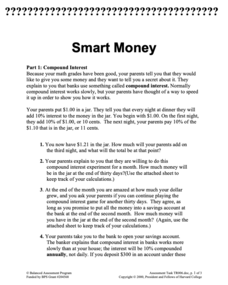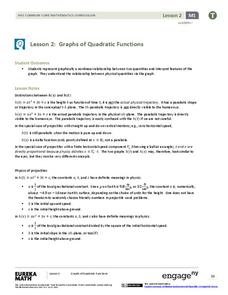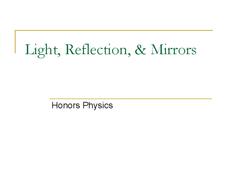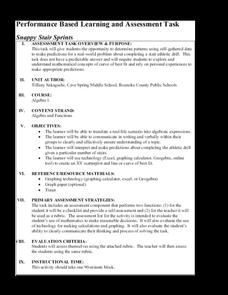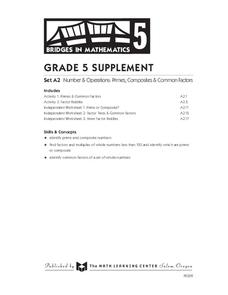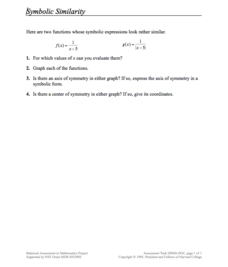Curated OER
Dividing Larger Numbers
As math scholars begin taking on more complex division problems, it's time to cover the different ways to show remainders. Here, they complete eight long-division equations with a fraction remainder and then eight more with a unit...
Laying the Foundation
Box-and-Whisker Plots
Statistics is made approachable, and dare we say fun, in this activity on using box-and-whisker plots to analyze and compare data sets. Specific emphasis is placed on interpretations and explanations while graphing, and in using the...
Messenger Education
Give Me a Boost—How Gravity Assists Aid Space Exploration
The propellant needed for space explorations runs in the thousands, while paying to get the craft into orbit costs millions! In the second installment of three, two activities explore laws of conservation of energy and momentum. Using...
Balanced Assessment
Scaling the Stars
Examine ratio and scale through coordinate geometry. Scholars use two diagrams of different scale to calculate perimeter and area. Then, individuals use the perimeters and areas to find ratios.
Me and My Shadow
Trace My Shadow
Which creates more digital traces: surfing the Internet in a coffee shop, or using an iPhone to send a text message? The answer may surprise you! An interactive resource prompts users to choose which devices, operating systems, and...
Concord Consortium
Smart Money
Watch the money grow daily. Scholars tackle a problem to determine how much money they will have if a dollar grows at 10 percent compounded daily after a month. Using that knowledge, learners notice the difference between varying savings...
Las Cumbres Observatory
How Big is the Solar System?
Find out if it's possible to travel to the edge of the solar system. Learners use a piece of string to model the distance between planets in the solar system. They then use the distances to calculate how long it would take to travel to...
Flipped Math
Calculus AB/BC - Approximating Areas with Riemann Sums
There are several ways to estimate the area if the curve does not create nice geometric figures. The presenter introduces the idea of using areas of rectangles to estimate the area under the curve. Pupils use four types of Riemann Sums,...
EngageNY
Graphs of Quadratic Functions
How high is too high for a belly flop? Learners analyze data to model the world record belly flop using a quadratic equation. They create a graph and analyze the key features and apply them to the context of the video.
Willow Tree
Simple Probability
The probability of learning from this lesson is high! Learners calculate probabilities as numbers and as decimals. They see how to use a complement to find a probability and even try a simple geometric probability problem.
Bowels Physics
Light, Reflection, and Mirrors
Explore the connection of light, reflection, and mirrors. A comprehensive lesson introduces the basics of light in relation to reflection and mirrors. After an explanation of the vocabulary, the presentation shows how to create ray...
101 Questions
Brita
It's hard to envision what 39 billion plastic bottles look like. Brita claims that the US uses that number of plastic bottles each year! If that's not enough to get your attention, figure out how many times 39 billion water bottles can...
CCSS Math Activities
Smarter Balanced Sample Items: 8th Grade Math – Target H
Pythagoras is all about being right. A presentation provides sample items for how the Pythagorean Theorem standards may show up in Smarter Balanced assessments. Seven items use the Pythagorean Theorem to find the sides of a right...
PHET
Graphing Lines
Ready to increase pupils' understanding of slope with an upward slope? Scholars use an interactive that allows users to move two points on a coordinate plane. The interactive then automatically calculates the slope, the slope-intercept...
Radford University
Snappy Stair Sprints
Let's go for a run. Small groups determine a way to collect data to determine the time it would take to run a set of stairs. After creating a plan, teams collect data and graph their results, calculating the equation of best fit and...
Museum of Science
Cookie Mining
Knock a chip off the cookie. Learners purchase a property to mine and mining tools. Pupils use their tools to mine chocolate chips out of a cookie for 5 minutes and return cookie fragments to its original site. After the time is over,...
Flipped Math
Inverse Trig Ratios
Put trigonometric ratios into inverse. Scholars learn how to find an unknown angle in a right triangle by using inverse trigonometric ratios. The pupils understand how the inverses undo a trigonometric ratio to provide the angle measure....
PBS
Garden Grade 6 Area and Perimeter
Engage young mathematicians in applying their knowledge of area and perimeter with a fun geometry lesson. Through a series of problem solving exercises, children use their math knowledge to design different-sized garden plots that meet...
Math Learning Center
Grade 5 Supplement Set A2 – Number and Operations: Primes, Composites and Common Factors
Incorporate riddles into your math lesson by having students make tree factors and determine if the number is a prime or composite. They will also use other clues to find the answer to the riddle while sharpening their multiplication...
West Contra Costa Unified School District
Law of Sines
Laws are meant to be broken, right? Learners derive the Law of Sines by dropping a perpendicular from one vertex to its opposite side. Using the Law of Sines, mathematicians solve for various parts of triangles.
Illustrative Mathematics
Identifying Quadratic Functions (Vertex Form)
Pupils calculate the equation of a quadratic in vertex form from a specific graph and determine an equation that would fit the description of a parabola. The final question determines the individuals' understanding of the signs of the...
Bowels Physics
Waves and Sound
Explore how sound travels as waves with a straightforward lesson that explains the basics of waves in relation to sound. The presentation considers sound waves in both open and closed pipes and shows how to calculate wavelength and...
Magic of Physics
Unit Converter I
Talk about a cool tool! Convert between units with the click of a mouse using a handy online resource. Enter the starting measurement and units for quantities such as torque, speed, and inertia, then sit back and relax while the computer...
Concord Consortium
Symbolic Similarity
How many things does one transformation tell you? Learners compare and contrast the graphs of different parent functions with the same transformation. Using a rational and absolute value function, pupils identify key features of their...







